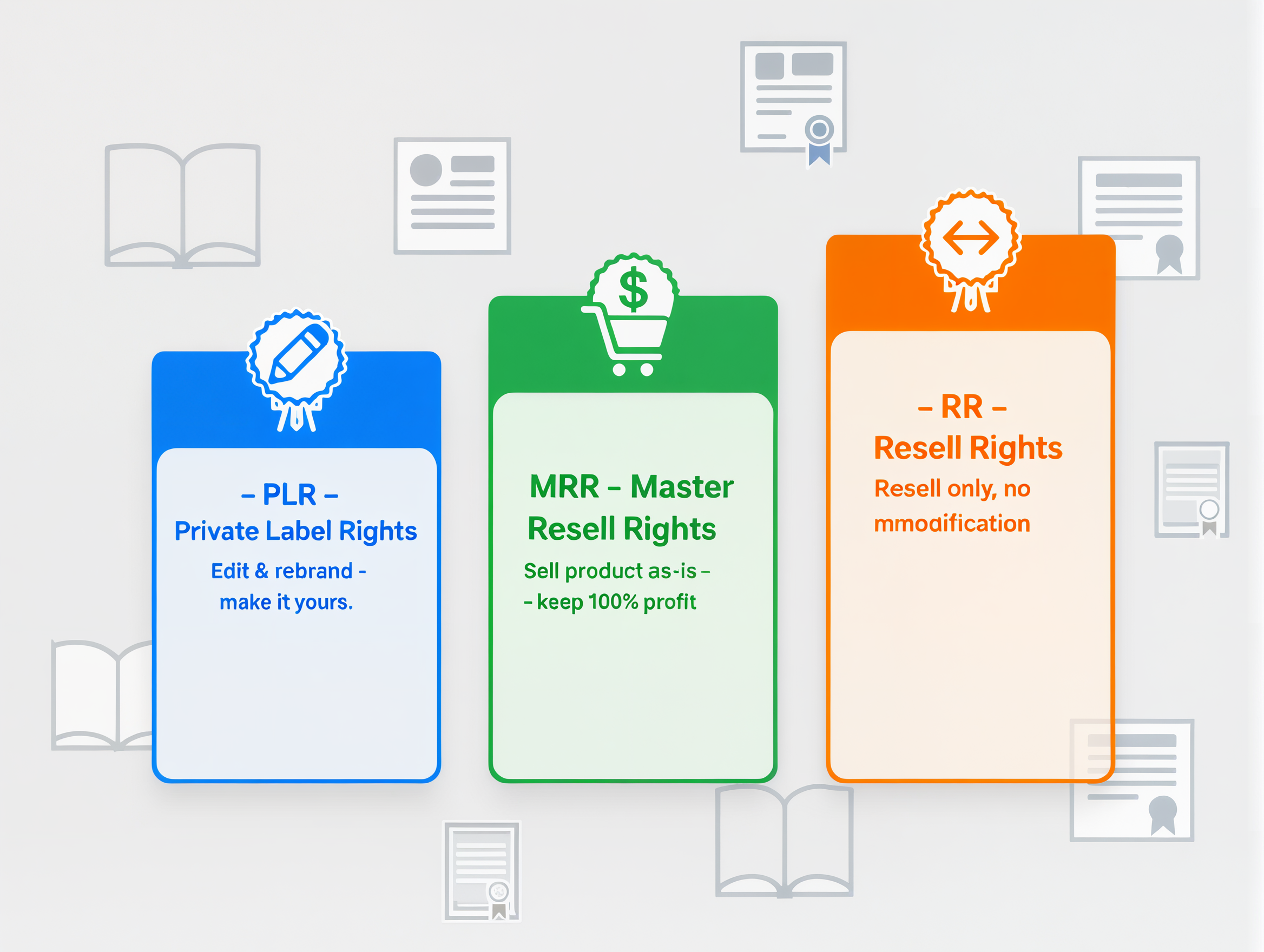Ebook licensing Understanding MRR Vs. PLR Vs. RR it might seem like a maze at first, but once you get the hang of it, everything clicks into place. Think of ebook licensing as a set of rules about what you can and can’t do with your digital content. Whether you dream of authoring bestsellers or just want to boost your business offerings, grasping ebook licensing is a game-changer.
In this era where digital content is king, understanding the ins and outs of licensing is your secret weapon. With ebooks flying around the internet, there’s a need to keep rights and permissions in check. Licensing sorts out who can sell, adapt, or distribute these digital goods. It’s the backbone of making sure creators get their fair share and users know where they stand.
Let’s talk about a few key terms. First up is ‘Master Resale Rights’ (MRR). This lets you not only sell an ebook to someone, but also pass on the resale rights, multiplying potential revenue streams. Then there’s ‘Private Label Rights’ (PLR), where you can modify the content as you wish. It’s like getting a book under your name with your own tweaks. Finally, ‘Resell Rights’ (RR) simply allow you to sell the product as-is. They all sound similar, but each has its own quirks and perks.
Master Resale Rights (MRR) – Unlocking Potential Profits
At the heart of Master Resale Rights (MRR) is its potential to open up broader revenue opportunities. MRR gives you the green light not just to sell the product but also to transfer resale rights to your buyers, turning them into sellers. Imagine owning a stall at a marketplace, and every buyer becomes a seller with your product. That’s what MRR does in the digital world.
So, what’s the deal with MRR for your business? First, it’s all about broadening your reach. The ability to pass on resale rights allows you to essentially create a network of sellers multiplying your reach and potential profits. It’s like setting up a franchise where every buyer is a new outlet.
But hang on, before jumping in, there are downsides to keep in mind. The market can get saturated. You’re not the only captain steering this ship, so multiple sellers mean fierce competition. Plus, the original creator often sets rules that limit how you can promote or package the product, so always know the restrictions before you commit.
For those excited about earning through MRR, success often boils down to choosing the right product. Seek out ebooks that align with market demand and focus on quality content, because lagging quality will sink sales fast. And remember, transparency with your buyers about what rights they’re getting can sidestep plenty of headaches.
Ultimately, avoiding mistakes involves reading the fine print. Analyze contracts carefully to ensure you’re not stepping on any toes. Knowing the terms will help you maximize benefits while staying within bounds. Knowledge is power, especially when rights and profits are on the line.
Private Label Rights (PLR) – Freedom to Customize
Private Label Rights (PLR) really take flexibility to the next level. With PLR, you can tweak, chop, and change the content as you like. Ever dreamed of being the mastermind behind a bestseller but don’t want to start from scratch? PLR lets you modify the text, slap your name on it, and even alter the book’s direction. It’s self-publishing with a head start.
The creative freedom that comes with PLR is a big win. You can transform a basic ebook into something unique that resonates with your audience. Personalize it with elements that match your brand’s voice, add engaging images, or spin the content to target a niche audience. It’s an exciting playground for creativity genuinely tailored to your needs.
Diving into PLR, strategies matter a lot. First off, always check the rights included and limitations set by the original creator. Some PLR content arrives with restrictions on what you can and can’t modify, so having eyes on that is crucial. From there, refine your marketing strategy. Consider how your revamped ebook can solve a problem or fill a gap in the market.
When selecting a PLR ebook, quality is key. Not every piece of PLR content is created equal. Vet the original content for coherence, accuracy, and overall quality before deciding. A great strategy is finding content that needs minimal editing but has high potential after customization.
Lastly, look for potential traps. Don’t just go for the first PLR bundle that comes your way because some are filled with outdated or overused content. Research extensively and ensure the rights are legitimate and up to date. Being careful upfront saves you from future headaches.
Resell Rights (RR) – A Simple Solution
Resell Rights (RR) offer a straightforward route into the world of digital sales. Essentially, RR allows you to sell a product as-is, without any additional rights to modify or pass on resale rights. It’s like buying a book and simply adding it to your inventory to sell, making it a hassle-free option for many.
The simplicity of RR is its biggest advantage. There’s no need to worry about editing content or adding personal touches—all you need is a platform to sell from. For beginners stepping into the digital marketplace, this can be an ideal way to get started with minimal fuss and lower initial investment.
Even though RR is simple, it still packs its own set of considerations. The limitations are clear-cut—you’re restricted to selling the product without any alterations. This means competing with other sellers who are offering the exact same product, making price competition a frequent battle.
Strategies for thriving with RR focus largely on marketing savvy. Picking a standout digital platform that reaches your target audience can give you the upper hand. It might also help to bundle products or add value through complementary services, keeping your offerings attractive despite the crowded market.
Common pitfalls in dealing with RR often involve overlooking terms and conditions. It’s crucial to fully understand the rights you’re purchasing to avoid any legal hiccups. Not every RR opportunity is primed for success, so having a discerning eye ensures you choose products with strong demand and room for profit.
Choosing the Right Licensing for Your Needs
Deciding on the right ebook licensing model hinges on understanding what aligns best with your goals and business plans. Think about where you want your digital venture to go, and let that guide your licensing decision. Are you looking to customize content or just want a product to sell as-is? Clarifying these aims can streamline your choices in the complex world of licensing.
When evaluating your licensing options, several factors come into play. Consider your skill level in creating or modifying content. If creativity and customization are your game, then Private Label Rights (PLR) could be the best fit. For those who prefer simplicity and speed, Resell Rights (RR) might offer exactly what you need without the complexity of alterations.
Next, evaluate market demand. Diving into niches that are oversaturated typically results in stiff competition, so it’s wisest to pick products that fulfill emerging or under-served needs. Also, keeping an eye on quality ensures you’re not caught in a cycle of dealing with refunds or unhappy customers.
Steering clear of licensing pitfalls is crucial for success in this space. Ensure you’re never blindsided by the terms and conditions that accompany each type of licensing. Knowing what’s allowed helps avoid breaches, and gives clarity on how best to leverage the rights you’ve acquired.
Now’s the time to take the plunge. Armed with insights from this breakdown, aligning your ebook strategies with the right licensing model can set the stage for thriving digital ventures. With each step measured and informed, you’re paving the path for a more agile and adaptable business.




